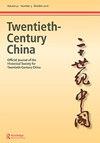Touring the Socialist World: The Political and Cultural Economy of China’s Outbound Tourism, 1956–1965
IF 0.5
Q1 HISTORY
引用次数: 0
Abstract
Abstract:Shortly after its establishment in the mid-1950s, the state-run China International Travel Service began to supplement its work hosting foreign tourists with a program of outbound tours for Chinese citizens to other socialist nations. This article examines this tourism program in the decade prior to the Cultural Revolution. I conclude that this tourist trade was part of the formation of a vision of socialist modernity and a component of the socialist world economy. Up until the late 1950s, China’s participation in tourist trade with the Soviet Union was motivated by economic concerns as much as by political ones, but China’s state tourism officials became preoccupied with the political implications of this exchange as relations between the two countries deteriorated. By the early 1960s, with the Soviet Union no longer a major economic partner and China’s vision of socialist modernity no longer a Soviet one, the rationale for this program largely evaporated.环游社会主义世界:1956-1965年中国出境游的政治文化经济
摘要:国营的中国国际旅行社在20世纪50年代中期成立后不久,就开始为接待外国游客提供中国公民到其他社会主义国家的出境游项目,以补充其接待外国游客的工作。这篇文章考察了文化大革命前十年的这个旅游项目。我的结论是,这种旅游业是社会主义现代性愿景形成的一部分,也是社会主义世界经济的一个组成部分。直到20世纪50年代末,中国参与与苏联的旅游贸易既是出于经济考虑,也是出于政治考虑,但随着两国关系的恶化,中国国家旅游官员开始关注这种交流的政治影响。到20世纪60年代初,随着苏联不再是主要的经济伙伴,中国对社会主义现代化的愿景也不再是苏联的愿景,这一计划的理由基本上消失了。
本文章由计算机程序翻译,如有差异,请以英文原文为准。
求助全文
约1分钟内获得全文
求助全文

 求助内容:
求助内容: 应助结果提醒方式:
应助结果提醒方式:


